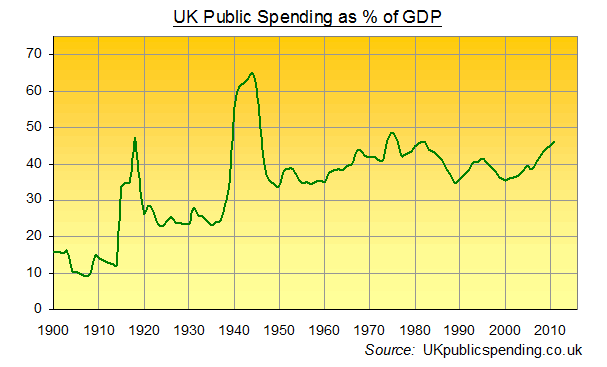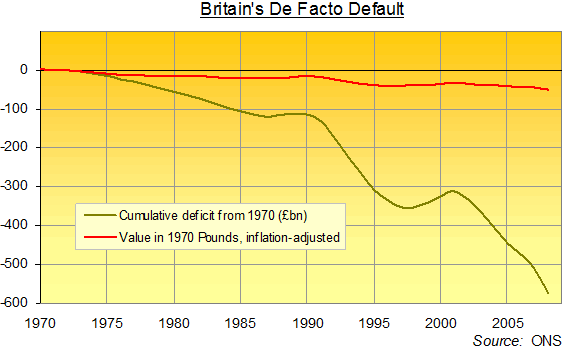Bankrupt Britain, A Short History
Economics / UK Debt Oct 28, 2009 - 05:26 PM GMTBy: Adrian_Ash
 "If we manage to escape national bankruptcy, we have set up a slavery far more oppressive than any previous form of bondage..."
"If we manage to escape national bankruptcy, we have set up a slavery far more oppressive than any previous form of bondage..."
BRITAIN'S BANKRUPTCY has been a long time coming.
"By our political folly we have a put a large part, probably the greater part, of the nation in possession of rights to draw from the public purse," wrote Ernest J.P.Benn in his hilarious Account Rendered of 1930.
How hilarious? Forced to live with the "smudge readers" at passport control, policemen demanding to see one's driving license down at the station, and Whitehall drones obsessed with how many pencil sharpeners their department controlled, Britain's moneyed classes knew the lower orders could only travel, drive and wear white-collared shirts if kill-joy regulations applied to the gentry and their staff alike.
But modern liberty, with its motor cars and mortgages, offered to keep Bolshevism out of Britain. Along with homes "fit for heroes" and the basic state pension, however, regulating it all added to the government's annual expense – equal at the start of the Thirties to barely one-quarter of the economy.
That was already too great for the Pound Sterling to bear...

"Whether those [state-funded] rights take the form of relief, dole, pension, official salary, subsidy or interest on public debt, they all constitute heavy claims on our total production," wrote Benn.
"If happily, we manage to escape national bankruptcy, we have set up a slavery for the minority, the producers, far more oppressive than any previous form of bondage..."
Roll on 35 years, and even with Ernest's young socialist nephew – Anthony Wedgwood – grandstanding against reducing expenses, Britain just about avoided bankruptcy once more. Yet again, however, the other option – of defaulting in fact, if not in name – was too good to resist.

Just as the state defaulted in 1931, quitting the Gold Standard and offering to pay only more paper in return for Pounds, so the UK has long serviced and repaid its debts in devalued notes.
Prior to abandoning the Gold Standard eight decades ago, only Charles II had reneged on his debts, ordering a "stop of the Exchequer" in 1672 that halted payment of interest on any debt without a specific tax revenue ear-marked to cover it. Whereas across the Channel, in contrast, the French monarchy defaulted in part or in total four times in the 17th century, and then again in 1714, 1721, 1759, 1770 and finally in 1788 – one year before the Revolution.
By 1797, the new government also found itself unable to service or settle its debt, writing off two-thirds of the entire national debt. Hence the higher rates of interest paid on French debt, reckoned by Niall Ferguson to be "of the order of one or two percentage points" between 1745 and 1780, and wilder still – according to his charts at least – during and immediately after Madame Guillotine set about the rentiers.
"These differentials were based on past experience of which bonds were most likely to be defaulted upon," writes the Oxford (now Harvard) scholar in The Cash Nexus (2001). Higher interest rates were a form of "prepaid repudiation" as another historian has called it. And short of a deep and long-lived deflation in prices, that pre-payment is entirely absent today.
"Plenty of commentators see the risks that arise from not getting a handle on excessive spending...not getting control of the deficit," says Philip Hammond, Conservative spokesman on Treasury matters.
Given what the 2010 election might mean for the Pound – or rather, what the market might take it to mean – it's worth heeding just what Hammond told Bloomberg this week.
"We believe that what's got Britain through the recession so far has been the activist monetary policy of the Bank of England – keeping interest rates low, supporting the economy through quantitative easing – and we think it is essential that in the recovery we are able to continue to keep monetary policy relatively loose.
"We will only be able to do that if we have got the deficit under control, and sent a clear signal to the markets that we intend to execute a plan, and in order to do that we need to get started.
"Nobody's talking about slashing [public spending] in 2010, but we need to make a start. The [Labour] government's planning a £30 billion increase...We think that's too much. We would scale that back."
As we've long suspected here at BullionVault, in short, David Cameron's "New Tories" can grasp the financial case for reduced public spending. So could my five-year old...and my cat, come to that. But unlike the last Conservative party to stand on the brink of wresting public finance away from an economically illiterate Labour administration, the British Tories daren't make or even conceive the ideological case for reducing the size of the state today, let alone its expense.
A return to Thatcher? We should be so lucky. And after 10 years when gold prices rose on the back of surging government deficits, record-low interest rates, and an avowed policy of currency devaluation, gilt-owners might want to consider the size of Britain's public debt, and the zero-rate policy its likely government wants to retain.
By Adrian Ash
BullionVault.com
Gold price chart, no delay | Free Report: 5 Myths of the Gold Market
City correspondent for The Daily Reckoning in London and a regular contributor to MoneyWeek magazine, Adrian Ash is the editor of Gold News and head of research at www.BullionVault.com , giving you direct access to investment gold, vaulted in Zurich , on $3 spreads and 0.8% dealing fees.
(c) BullionVault 2009
Please Note: This article is to inform your thinking, not lead it. Only you can decide the best place for your money, and any decision you make will put your money at risk. Information or data included here may have already been overtaken by events – and must be verified elsewhere – should you choose to act on it.
Adrian Ash Archive |
© 2005-2022 http://www.MarketOracle.co.uk - The Market Oracle is a FREE Daily Financial Markets Analysis & Forecasting online publication.



